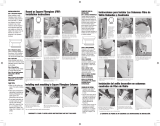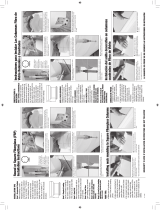
Square L-Shaped PermaWrap
®
Column Installation Instructions
TEMPERATURE RELATED ISSUES:
PVC Columns become more brittle in colder temperatures. When
the columns become more brittle, they are more susceptible to
damage. It is recommended that the columns themselves be
warmed to 50° to 55° before installing. This can be accomplished by moving the columns into a
heated space, and allowing adequate time for the temperature of the columns to warm up. The out-
door ambient temperature can be considerably colder than 50°, but if the columns themselves can
be warmed up, they can then be installed with reduced risk of damaging them in the process. If you
are unable to warm the columns before installation, you should first drill pilot holes before screwing
or nailing them together. Be careful when nailing the columns and try to avoid striking the column
faces with a hammer. Note that if your particular columns are designed in such a way that they
include miter folded corners, which have not been folded, closed, they will definitely be susceptible
to fracture if they cannot be warmed. If a miter-folded corner does fracture, you will still have a good
miter joint, which consists of (2) separate pieces.
CUTTING AND FASTENING:
The Cellular PVC material that the columns are constructed of can easily be cut with conventional
carpentry and woodworking tools. Pneumatic finish nailers and staplers can be used to fasten
Cellular PVC parts together. Large pneumatic framing staplers and nailers are not suitable for fas-
tening this material as the percussion of the drivers of large nail guns can fracture the PVC materi-
al. Coarse thread, galvanized or stainless steel drywall screws are also suitable for fastening Cellular
PVC parts together. It is suggested that pilot holes be used for screws longer than 1 5/8".
PAINTING AND FINISHING:
Caulk where required using Siroflex brand Sealant and Adhesive provided by manufacturer. Putty any
holes using acrylic putty or caulk. Lightly sand or scuff surface of column. Clean surface of column
to remove any dirt or hand oil residue with light detergent and water, denatured alcohol, or window
cleaner. Be sure to remove soap residue with clean water. Apply one coat of 100% acrylic exterior
primer and one or more finish coats of 100% acrylic exterior paint. Do not paint columns using dark
colors (dark colors are considered any color that falls within the L value of 56 to 0). L is the meas-
ure of lightness of an object and ranges from 0 (black) to 100 (white).
Do not install below grade.
THE PVC COLUMN HAS NO TESTED STRUCTURAL PROPERTIES. The
column is designed to install around a previously installed structural
post. The structural post inside column, supplied by others, provides
the load-bearing component of the column. The load-bearing capacity
of column is determined by the physical properties of the structural
post. The architect or engineer will specify load-bearing requirements
of the structural post. Structural post must be of ACQ, CCA or other
treated lumber, ACQ, CCA or other treated engineered lumber, or steel.
DO NOT USE UNTREATED LUMBER FOR STRUCTURAL POSTS.
Possible infiltration of water and possible condensation inside the PVC
column shaft can cause degradation of untreated lumber! Bottom of
structural post should be mounted to wooden deck or concrete/mason-
ry porch floor using code-approved method and code approved post
anchor. Top of structural post should be mounted to beam using code-
approved method and code approved post-to-beam mounting bracket.
1. CUT THE COUMN TO THE DESIRED LENGTH. THIS CAN BE DONE USING A SKILL SAW OR JIG SAW.
2. FASTEN THE 5” X 3-1/2” PVC MOUNT-
ING BLOCKS TO THE 4” X 4” POST SO THE
C
OLUMN WILL BE CENTERED AROUND
THE POST. BE SURE TO ATTACH AT LEAST
2 BLOCKS TO THE 4” X 4” AT THE TOP, AND
2 -AT THE BOTTOM. IF A HANDRAIL IS
GOING TO BE ATTACHED, ADD BLOCKS TO
THE 4” X 4” WHERE THE RAIL MOUNTING
WILL TAKE PLACE.
3. INSTALL ONE L-SHAPED HALF
AROUND THE 4” X 4” POST AND
FASTEN THROUGH THE FACES
OF THE COLUMN HALF INTO THE
MOUNTING BLOCKS. YOU MAY
FASTEN INTO THE FACES OR THE
E
NDS OF THE MOUNTING
BLOCKS.
3. INSTALE UNA DE LAS SEC-
CIONES DE COLUMNA EN FORMA
DE “L” ALREDEDOR DEL POSTE DE
4” X 4” Y ASEGÚRELA A ESTE. UD
PUEDE ANCLARSE A LA CARA O AL
C
OSTADO DE LAS PIEZAS PROVIS-
TAS.
2. CLAVE LAS PIEZAS DE PVC DE 5” X 3-1/2” AL
POSTE DE 4X4 DE TAL MANERA QUE LA
COLUMNA QUEDE CENTRADA ALREDEDOR DEL
POSTE. ASEGÚRESE DE CLAVAR POR LO MENOS
2
DE ELLOS EN LA PARTE SUPERIOR Y OTROS 2
EN LA PARTE INFERIOR DEL POSTE DE 4X4, SI
SE PIENSA INSTALAR PASAMANOS, INSTÁLE-
LOS TAMBIÉN A LA ALTURA REQUERIDA.
5. SLIDE THE 2ND L-SHAPED COLUMN HALF IN PLACE AND PUSH
THE MITERED EDGES TOGETHER. SCREW TOP AND BOTTOM OF
THE COLUMN SHAFT INTO THE TOP & BOTTOM SQUARING
BLOCKS. FASTEN THE COLUMN ALONG BOTH EDGES AS WELL AS
ATTACHING IT TO THE SQUARING BLOCKS. WE RECOMMEND FAS-
TENING THE COLUMN EVERY 6 TO 8 INCHES USING 1-1/4” STA-
PLES. FINISH NAILS WORK ALSO. WIPE OFF ANY ADHESIVE CAULK
S
QUEEZE-OUT WITH DAMP CLOTH. THE ADHESIVE CAULK
CLEANS UP WITH WATER. IT IS IMPORTANT TO WIPE OFF THE
EXCESS ADHESIVE CAULK BEFORE IT DRIES!
6. ATTACH THE BASE AND CAP COLLARS TO THE COLUMN
SHAFT. APPLY ADHESIVE TO THE MITERED EDGES & WRAP THE
COLLARS AROUND THE SHAFT AT THE TOP AND BOTTOM.
F
ASTEN THE COLLARS TO THE SHAFT AND FASTNEN BOTH
HALVES TOGETHER AT THE CORNERS. WIPE OFF ANY ADHESIVE
SQUEEZE-OUT WITH DAMP CLOTH. THE ADHESIVE CLEANS UP
WITH WATER. IT IS IMPORTANT TO WIPE OFF THE EXCESS
ADHESIVE BEFORE IT DRIES! USE THE ADHESIVE CAULK TO
CAULK THE SMALL GAP BETWEEN THE BACK OF THE COLLARS
AND THE COLUMN SHAFT.
4. APPLY ADHESIVE CAULK TO
THE 2 MITERED EDGES OF
THE L-SHAPED COLUMN
SHAFT.
LA COLUMNA DE PVC CARECE DE PROPIEDADES AUTOPOR-
TANTES. La columna esta diseñada para ser instalada alrededor de un
poste estructural existente. El poste estructural al interior de la colum-
na, y suministrado por terceros, representa la característica estructur-
al. La capacidad autoportante de la columna esta determinada por las
características físicas del poste. El Arquitecto o el Ingeniero se encar-
garán de especificar los requerimientos estructurales del poste. El
poste estructural debe ser ACQ, CCA o de otra madera inmunizada,
ACQ, CCA, o de un elemento de madera reforzada e inmunizada o de
acero. NO USE MADERA SIN INMUNIZAR COMO POSTES ESTRUC-
TURALES, ya que esta puede ser afectada por infiltraciones de agua o
condensaciones dentro de la columna. El poste se debe asegurar al
suelo y a la viga usando solamente métodos y anclajes aprobados por
el código de construcción.
ASPECTOS RELACIONADOS CON LA TEMPERATURA:
Las columnas de PVC se tornan más frágiles al ser expuestas a
bajas temperaturas siendo más susceptibles al daño. Se
recomienda ambientar las columnas a una temperatura de 50 o
55 grados antes de instalarlas. Esto se puede lograr llevando las
columnas a un lugar con calefacción y permitir que suba la temperatura de las columnas. Aunque
la temperatura exterior sea bastante inferior a 50 grados, las columnas se pueden instalar si han
sido previamente ambientadas reduciendo de esta manera la posibilidad de causarles daño. Si no
es posible ambientar las columnas antes de instalarlas, UD deberá hacer unas perforaciones ini-
ciales con una broca pequeña antes de usar tornillos o puntillas para el ensamblaje. Tenga cuida-
do al usar puntillas de no golpear las columnas con el martillo. Tenga presente que si las columnas
tienen esquinas que no han sido previamente dobladas, es posible que se quiebren si no han sido
ambientadas. En caso de que esto suceda, Ud. de todos modos tendrá 2 cuerpos con esquinas bien
definidas.
CORTES Y ASEGURAMIENTO
El material de PVC usado para fabricar las columnas puede ser fácilmente cortado con herramien-
tas convencionales de carpintería o ebanistería. Para ensamblar las columnas utilice pistolas
pequeñas de aire para puntillas o grapas. Las pistolas grandes pueden ocasionar daño debido la
percusión que generan. Tornillos de rosca ancha y grapas galvanizadas o inoxidables para “Sheet
Rock” también son recomendadas.
PINTURA Y ACABADO
Macille cuando sea necesario usando el pegante suministrado por el fabricante. Rellene los huecos
usando macilla acrílica. Suavemente lije y empareje la superficie de la columna. Use un detergente
liviano y agua, alcohol natural o limpiador de vidrios para limpiar el mugre o residuos de aceite.
Asegúrese de remover residuos de jabón con agua limpia. Aplique una capa de base 100% acríli-
ca y una o más capas de pintura para exteriores100% acrílica. No pintar las columnas con los col-
ores oscuros (los colores oscuros son considerados de cualquier color que se encuentre dentro del
valor de L de 56 a 0). L es la medida de luminosidad de un objeto y va de 0 (negro) a 100 (blanco).
No instale por debajo del nivel.
I
nstrucciones de Instalacion para
C
olumna Cuadrada PermaWrap
®
6. SITUE LOS COLLARES ALREDEDOR DE LA COLUMNA APLICANDO PEGANTE EN LOS BORDES EN
ANGULO. ASEGURE AMBAS A LA COLUMNA Y ENTRE ELLAS MISMAS LIMPIANDO EL PEGANTE AL
FINALIZAR CON UN TRAPO HUMEDO. USE EL MISMO PEGANTE PARA SELLAR LOS ESPACIOS ENTRE LA
COLUMNA Y LOS COLLARES.
4. APLIQUE EL PEGANTE A LOS
BORDES DE UNA DE LAS SEC-
CIONES EN “L”.
1. CORTE LA COLUMNA A LA DISTANCIA QUE NECESITE USANDO UNA SIERRA MANUAL O UNA ELECTRICA.
5
. POSICIONE LA OTRA SECCIÓN EN FORMA DE “L” Y ATORNILLE LA
COLUMNA A LAS ESCUADRAS INTERNAS TANTO ARRIBA COMO
ABAJO Y VERTICALMENTE A LO LARGO DE LAS UNIONES CADA 6 U
8 INCHES USANDO GRAPAS DE 1-1/4” O PUNTILLAS PARA ACABA-
DO. LIMPIE CON UNA TOALLA HÚMEDA LOS EXCESOS DE PEGANTE
ANTES DE QUE SE ENDUREZCAN.
72884 TKM back.QXP_27384 HBG 5/18/15 3:58 PM Page 1
-
 1
1
HB&G 316693 Instrucciones de operación
- Tipo
- Instrucciones de operación
- Este manual también es adecuado para
en otros idiomas
- English: HB&G 316693 Operating instructions
Artículos relacionados
Otros documentos
-
LifeProof I124513L Guía de instalación
-
LifeProof I112205L Guía de instalación
-
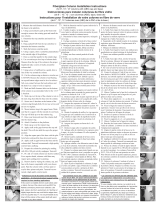 Turncraft 72231 Guía de instalación
Turncraft 72231 Guía de instalación
-
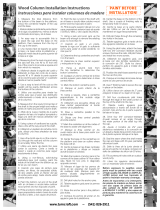 Turncraft 1068N Guía de instalación
Turncraft 1068N Guía de instalación
-
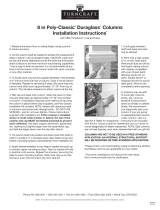 Turncraft 08358 Guía de instalación
Turncraft 08358 Guía de instalación
-
RDI PVB550W Guía de instalación
-
none 402005 Guía de instalación
-
James Hardie 667421 Guía de instalación
-
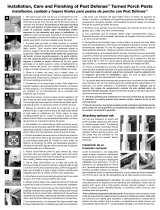 Turncraft D3168A Guía de instalación
Turncraft D3168A Guía de instalación

